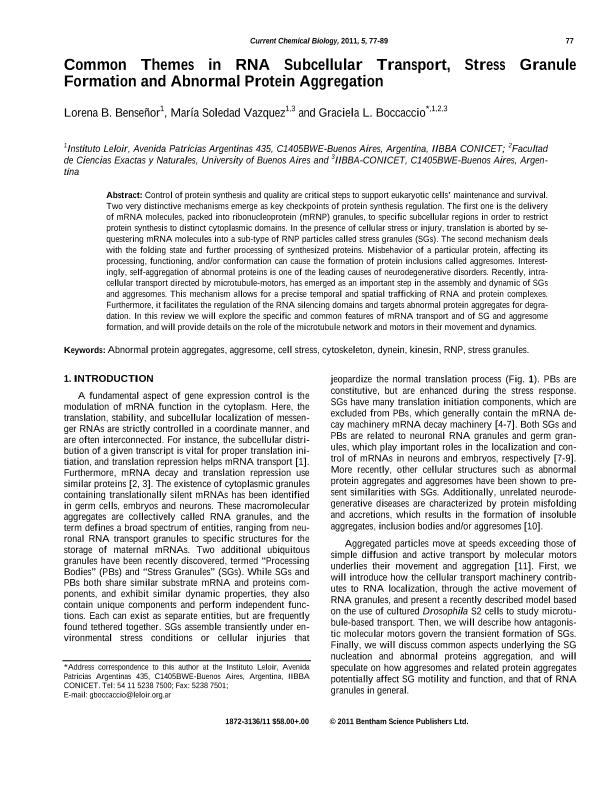Mostrar el registro sencillo del ítem
dc.contributor.author
Benseñor, Lorena Betsabe

dc.contributor.author
Vazquez, Maria Soledad

dc.contributor.author
Boccaccio, Graciela Lidia

dc.date.available
2020-03-25T21:13:20Z
dc.date.issued
2011-05
dc.identifier.citation
Benseñor, Lorena Betsabe; Vazquez, Maria Soledad; Boccaccio, Graciela Lidia; Common Themes in RNA Subcellular Transport, Stress Granule Formation and Abnormal Protein Aggregation; Bentham Science Publishers; Current Chemical Biology; 5; 2; 5-2011; 77-89
dc.identifier.issn
2212-7968
dc.identifier.uri
http://hdl.handle.net/11336/100832
dc.description.abstract
Control of protein synthesis and quality are critical steps to support eukaryotic cells’ maintenance and survival. Two very distinctive mechanisms emerge as key checkpoints of protein synthesis regulation. The first one is the delivery of mRNA molecules, packed into ribonucleoprotein (mRNP) granules, to specific subcellular regions in order to restrict protein synthesis to distinct cytoplasmic domains. In the presence of cellular stress or injury, translation is aborted by sequestering mRNA molecules into a sub-type of RNP particles called stress granules (SGs). The second mechanism deals with the folding state and further processing of synthesized proteins. Misbehavior of a particular protein, affecting its processing, functioning, and/or conformation can cause the formation of protein inclusions called aggresomes. Interestingly, self-aggregation of abnormal proteins is one of the leading causes of neurodegenerative disorders. Recently, intracellular transport directed by microtubule-motors, has emerged as an important step in the assembly and dynamic of SGs and aggresomes. This mechanism allows for a precise temporal and spatial trafficking of RNA and protein complexes. Furthermore, it facilitates the regulation of the RNA silencing domains and targets abnormal protein aggregates for degradation. In this review we will explore the specific and common features of mRNA transport and of SG and aggresome formation, and will provide details on the role of the microtubule network and motors in their movement and dynamics.
dc.format
application/pdf
dc.language.iso
eng
dc.publisher
Bentham Science Publishers

dc.rights
info:eu-repo/semantics/openAccess
dc.rights.uri
https://creativecommons.org/licenses/by-nc-sa/2.5/ar/
dc.subject
Stress granule
dc.subject
aggresome
dc.subject
neurodegeneration
dc.subject
P Bodies
dc.subject.classification
Otras Ciencias Naturales y Exactas

dc.subject.classification
Otras Ciencias Naturales y Exactas

dc.subject.classification
CIENCIAS NATURALES Y EXACTAS

dc.title
Common Themes in RNA Subcellular Transport, Stress Granule Formation and Abnormal Protein Aggregation
dc.type
info:eu-repo/semantics/article
dc.type
info:ar-repo/semantics/artículo
dc.type
info:eu-repo/semantics/publishedVersion
dc.date.updated
2020-03-13T13:36:59Z
dc.identifier.eissn
1872-3136
dc.journal.volume
5
dc.journal.number
2
dc.journal.pagination
77-89
dc.journal.pais
Estados Unidos

dc.journal.ciudad
Oak Park
dc.description.fil
Fil: Benseñor, Lorena Betsabe. Consejo Nacional de Investigaciones Científicas y Técnicas. Oficina de Coordinación Administrativa Parque Centenario. Instituto de Investigaciones Bioquímicas de Buenos Aires. Fundación Instituto Leloir. Instituto de Investigaciones Bioquímicas de Buenos Aires; Argentina
dc.description.fil
Fil: Vazquez, Maria Soledad. Consejo Nacional de Investigaciones Científicas y Técnicas. Oficina de Coordinación Administrativa Parque Centenario. Instituto de Investigaciones Bioquímicas de Buenos Aires. Fundación Instituto Leloir. Instituto de Investigaciones Bioquímicas de Buenos Aires; Argentina
dc.description.fil
Fil: Boccaccio, Graciela Lidia. Consejo Nacional de Investigaciones Científicas y Técnicas. Oficina de Coordinación Administrativa Ciudad Universitaria. Instituto de Química Biológica de la Facultad de Ciencias Exactas y Naturales. Universidad de Buenos Aires. Facultad de Ciencias Exactas y Naturales. Instituto de Química Biológica de la Facultad de Ciencias Exactas y Naturales; Argentina. Consejo Nacional de Investigaciones Científicas y Técnicas. Oficina de Coordinación Administrativa Parque Centenario. Instituto de Investigaciones Bioquímicas de Buenos Aires. Fundación Instituto Leloir. Instituto de Investigaciones Bioquímicas de Buenos Aires; Argentina
dc.journal.title
Current Chemical Biology
dc.relation.alternativeid
info:eu-repo/semantics/altIdentifier/url/http://www.eurekaselect.com/94397/article
dc.relation.alternativeid
info:eu-repo/semantics/altIdentifier/doi/http://dx.doi.org/10.2174/2212796811105020077
Archivos asociados
